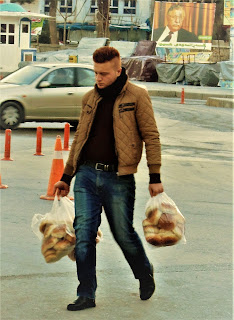Thursday, January 28, 2016 at 6 pm was the long awaited minute. The CPT Iraqi Kurdistan team had scurried all over the city of Sulaimani buying flip-chart paper here and toilet paper there. We needed extra supplies of kerosene and two rechargeable lanterns for the inevitable electricity cuts. We found all the handouts on our computer, had them printed and bought red binders to hold them.
The moment arrived and supper was hot. They began to enter the CPT house-the eager, excited, laughing new CPT trainees.
I stood in the doorway to our team's kitchen looking on the scene. The new lantern was put to immediate use, so the florescent glow lit the faces and the steam from the food. I felt joy and anticipation fill my chest. We were beginning the journey.
About half of the trainees are also working or studying full time so our schedule is different than a usual training in Chicago. Instead of spending 30 days together, they all come on Thursday evening for supper and then spend over 3 hours, late into the night, intent on learning the material. Then bright and early on Friday morning- the usual day off- they are ready to begin again. By 930 pm many of them go home and the week begins again.
In mid March the region has the Spring holidays for Nawroz. The trainees will then come every day -early until late- so that all the material can be covered before early April
This training is unique to any I have attended or facilitated in the six years since I joined CPT. There are ten trainees: one from Poland, one from Colombia and eight from Kurdistan-Iraq and Syria. It is a multi-faith group: Christian, Muslim, seeking and those that have a deep spirituality but who do not identify with a specific organised faith.
We facilitate the sessions in English with space for those more fluent to explain a concept in Kurdish. Then while we are on break time, Kurdish is the dominate language, with explanations in English for those of us not as proficient as we should be.
Most of the trainee's lives have been directly impacted by the violence in the region. We heard several times on the first day indications of this. One person asked permission to keep his phone on with the tone turned off. His father was heading to the front line and he needed to aware of when that would happen. Others spoke of people they have lost due to separation or death due to the war that is happening throughout their countries.
Our first role play where they simulated walking alongside farmers
in Hebron who were harvesting olives.
One of our first spontaneous activities was to attend a vigil to remember and grieve for the 58 people including 25 Iraqi Kurds who drowned in the Aegean Sea last week. These are the things we had to process on our second day of training.
I sit in the room with these amazing people as someone who has had six years of experience with CPT. I facilitate my sessions with some knowledge of what we want them to learn or think about. Yet, I know that when I leave Iraqi Kurdistan on 17 March, I will have learned so much more from them.
This week we began to work on the module where they plan a public action. They agreed to an topic that faces a small bit of the oppression that is happening in this region. The trainees had to think hard of ways to get the message across in a way that would not endanger any of them. They knew that arrest in this country can bring with it beatings and, for some of them, deportation back to a war-torn country. Yet, they also knew that it is very important to speak to the powers that are causing the oppression. The consensus came down to a simple message with a subversive undertone. This week they will continue the planning to bring about the action next Friday.
One morning, as I ate breakfast with Jahne who is from Rojava (Syrian Kurdistan) she said, " The reason I want to be a part of CPT is that CPT works to change the small things. I can not change the war, or the government in my country but I can change the small things. That is what CPT does."
This amazing group is on the beginning of their journey.We have already grieved and danced and discussed and agreed and disagreed. They have a lot of listening, thinking, pondering and changing to do before the CPT training graduation at the beginning of April. I know that they have dreams of transforming the big things, in this region, in these countries, in this Middle East. However, along the way, they can start on the small things.
Amen and may it be so.







































